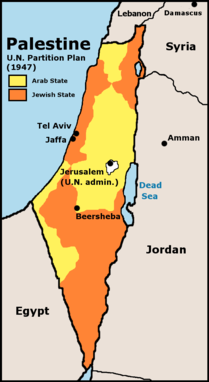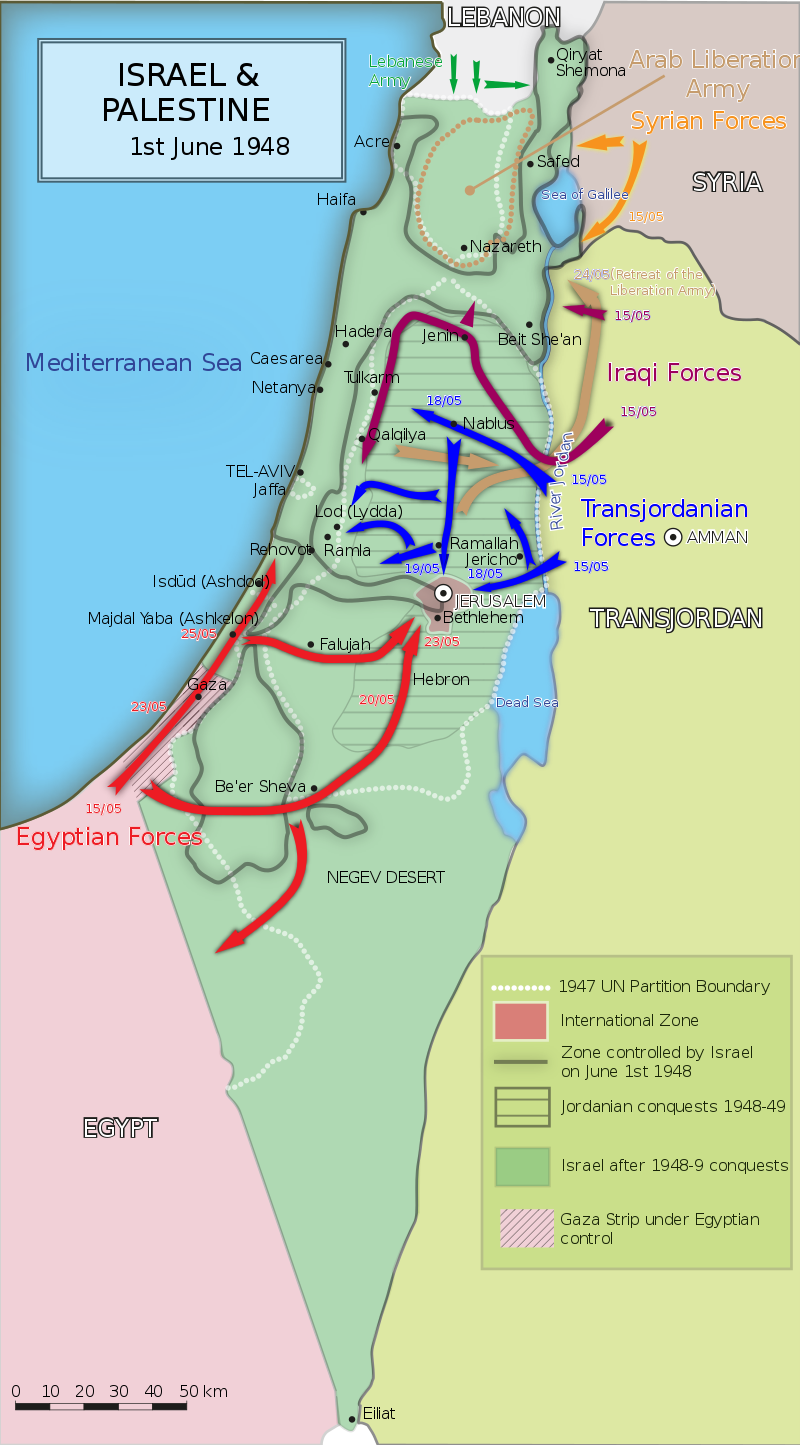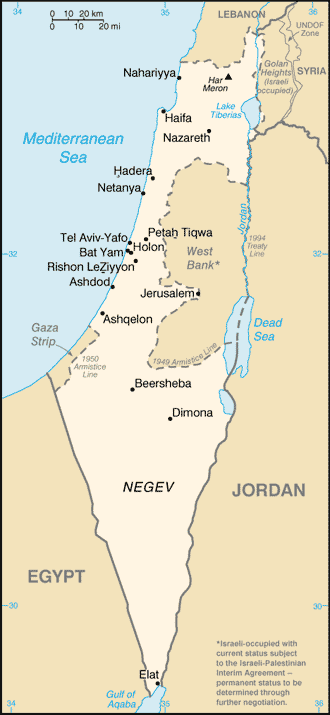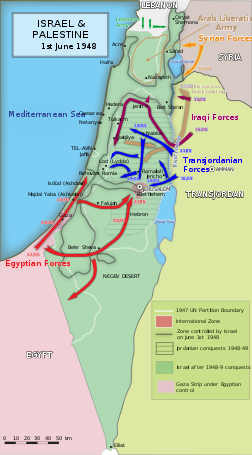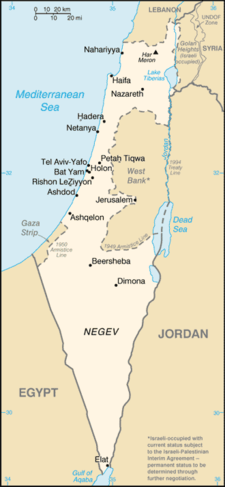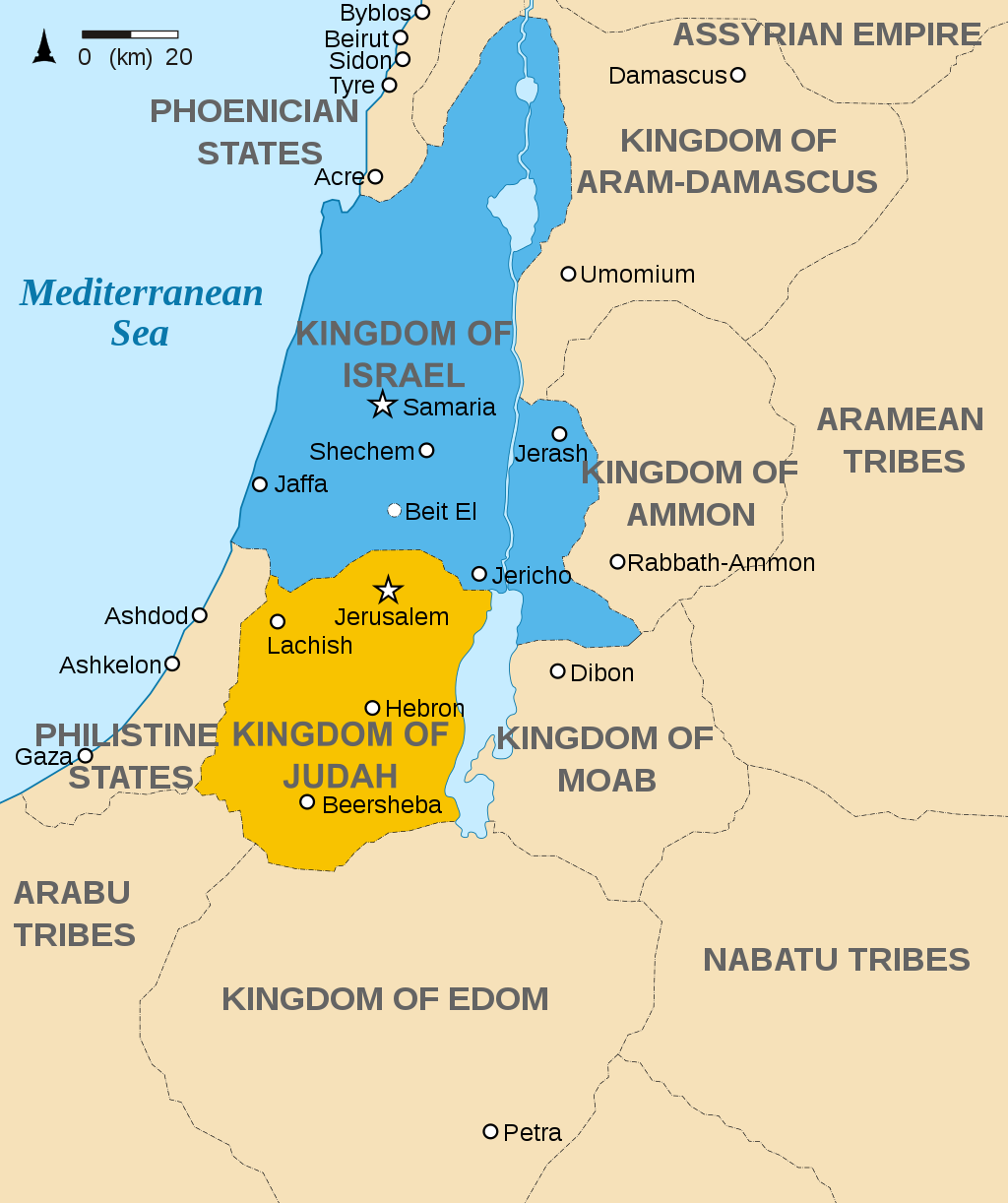- Mar 11, 2015
- 78,612
- 39,106
- 2,330
I don't think people really know the whole story. We see most people reflexively siding with Israel and calling those who oppose the Netanyu government Anti Semites. Seems like most people say that the Palestinians stated the war and everything is the Palestinians fault. They listen to various Jewish leaders taking about how the Palestinans sing from the river to the sea and how that's supposed to mean the Palestinians want to erase Jews. We have heard Netanyahu over and over again justifying occupations as defending Israels right to exist.
Maybe the story might just be the opposite of what we have been told.
First off, this entire stuation is the resut of another mess created by colonization. Palestine was once considred Mandatory Palestine and it was ruled by the Brits. In 1948 the Brits left Palestine and a war broke out.
The 1948 Palestine war[a] was fought in the territory of what had been, at the start of the war, British-ruled Mandatory Palestine.[12][13][14][15][16][17] During the war, the British withdrew from Palestine, Zionist forces conquered territory and established the State of Israel, and over 700,000 Palestinians fled or were expelled. It was the first war of the Israeli–Palestinian conflict and the broader Arab–Israeli conflict.
The war had two main phases, the first being the 1947–1948 civil war, which began on 30 November 1947,[18] a day after the United Nations voted to adopt the Partition Plan for Palestine, which planned for the division of the territory into Jewish and Arab sovereign states. During this period the British still maintained a declining rule over Palestine and occasionally intervened in the violence.[19][20] Towards the end of the civil war phase, Zionist forces executed Plan Dalet, an offensive operation conquering territory for the planned establishment of a Jewish state.[21]
The second phase of the war began on 14 May 1948, with the termination of the British Mandate and the declaration of the establishment of the State of Israel. The following morning, the surrounding Arab armies invaded Palestine, beginning the 1948 Arab–Israeli War. The Egyptians advanced in the south-east while the Jordanian Arab Legion and Iraqi forces captured the central highlands. Syria and Lebanon fought with the Israeli forces in the north. The newly formed Israel Defense Forces managed to halt the Arab forces and in the following months began pushing them back and capturing territory. By the end of the war, the State of Israel had captured about 78% of former territory of the mandate, the Kingdom of Jordan had captured and later annexed the area that became the West Bank, and Egypt had captured the Gaza Strip. The war formally ended with the 1949 Armistice Agreements, which established the Green Line demarcating these territories.
During the war, massacres and acts of terror were conducted by and against both sides. A campaign of massacres and violence against the Arab population, such as occurred at Lydda and Ramle and the Battle of Haifa, led to the expulsion and flight of over 700,000 Palestinians, with most of their urban areas being depopulated and destroyed. This violence and dispossession of the Palestinians is known today as the Nakba (Arabic for "the disaster")[22] and resulted in the beginning of the Palestinian refugee problem.
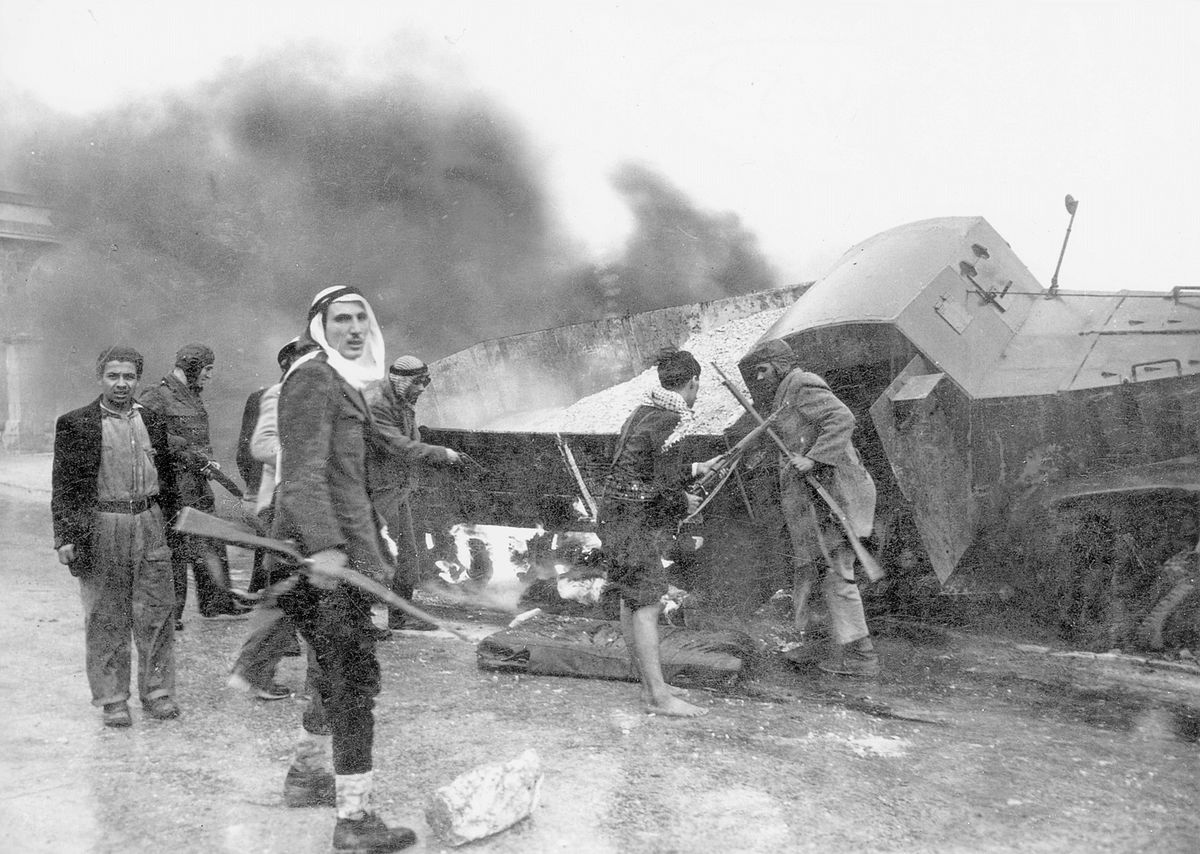
 en.wikipedia.org
en.wikipedia.org
The Nakba (Arabic: النكبة an-Nakbah, lit. 'The Catastrophe') was the ethnic cleansing[2] of Palestinians in Mandatory Palestine during the 1948 Palestine war through their violent displacement and dispossession of land, property, and belongings, along with the destruction of their society, culture, identity, political rights, and national aspirations.[3] The term is also used to describe the ongoing persecution and displacement of Palestinians by Israel.[4] As a whole, it covers the shattering of Palestinian society and the long-running rejection of the right of return for Palestinian refugees and their descendants.[5][6]
During the Nakba in 1948, approximately half of Palestine's predominantly Arab population, or around 750,000 people,[7] were expelled from their homes or made to flee, at first by Zionist paramilitaries through various violent means, and after the establishment of the State of Israel, by the Israel Defense Forces. This occurred in the wake of dozens of massacres targeting Palestinian Arabs and the depopulation of 500 Arab-majority towns and villages,[8] with many of these being either completely destroyed or repopulated by Jews and given new Hebrew names. By the end of the war, 78% of the total land area of the former Mandatory Palestine was controlled by Israel and at least 15,000 Palestinian Arabs had been killed.[9][10]
The Palestinian national narrative views the Nakba as a collective trauma that defines their national identity and political aspirations, whereas the Israeli national narrative views the same events in terms of the war of independence that established their aspirations for statehood and sovereignty.[11][12][13] To this end, the Palestinians observe 15 May as Nakba Day, commemorating the war's events one day after Israel's Independence Day.[14][15] In 1967 following the Six-Day War, another series of Palestinian exodus occurred; this came to be known as the Naksa (lit. 'Setback'), and also has its own day, 5 June.
The Nakba has greatly influenced Palestinian culture and is a foundational symbol of the current Palestinian national identity, together with the political cartoon character Handala, the Palestinian keffiyeh, and the Palestinian 1948 keys. Many books, songs, and poems have been written about the Nakba.[16] Nakba denial remains prevalent despite the growing scholarship on it, such as those by the Israeli New Historians.
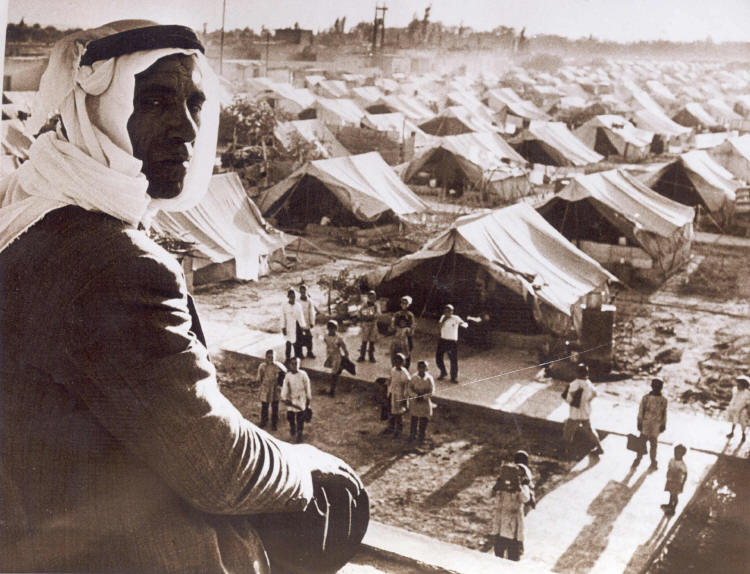
 en.wikipedia.org
en.wikipedia.org
Maybe the story might just be the opposite of what we have been told.
First off, this entire stuation is the resut of another mess created by colonization. Palestine was once considred Mandatory Palestine and it was ruled by the Brits. In 1948 the Brits left Palestine and a war broke out.
The 1948 Palestine war[a] was fought in the territory of what had been, at the start of the war, British-ruled Mandatory Palestine.[12][13][14][15][16][17] During the war, the British withdrew from Palestine, Zionist forces conquered territory and established the State of Israel, and over 700,000 Palestinians fled or were expelled. It was the first war of the Israeli–Palestinian conflict and the broader Arab–Israeli conflict.
The war had two main phases, the first being the 1947–1948 civil war, which began on 30 November 1947,[18] a day after the United Nations voted to adopt the Partition Plan for Palestine, which planned for the division of the territory into Jewish and Arab sovereign states. During this period the British still maintained a declining rule over Palestine and occasionally intervened in the violence.[19][20] Towards the end of the civil war phase, Zionist forces executed Plan Dalet, an offensive operation conquering territory for the planned establishment of a Jewish state.[21]
The second phase of the war began on 14 May 1948, with the termination of the British Mandate and the declaration of the establishment of the State of Israel. The following morning, the surrounding Arab armies invaded Palestine, beginning the 1948 Arab–Israeli War. The Egyptians advanced in the south-east while the Jordanian Arab Legion and Iraqi forces captured the central highlands. Syria and Lebanon fought with the Israeli forces in the north. The newly formed Israel Defense Forces managed to halt the Arab forces and in the following months began pushing them back and capturing territory. By the end of the war, the State of Israel had captured about 78% of former territory of the mandate, the Kingdom of Jordan had captured and later annexed the area that became the West Bank, and Egypt had captured the Gaza Strip. The war formally ended with the 1949 Armistice Agreements, which established the Green Line demarcating these territories.
During the war, massacres and acts of terror were conducted by and against both sides. A campaign of massacres and violence against the Arab population, such as occurred at Lydda and Ramle and the Battle of Haifa, led to the expulsion and flight of over 700,000 Palestinians, with most of their urban areas being depopulated and destroyed. This violence and dispossession of the Palestinians is known today as the Nakba (Arabic for "the disaster")[22] and resulted in the beginning of the Palestinian refugee problem.

1948 Palestine war - Wikipedia
The Nakba (Arabic: النكبة an-Nakbah, lit. 'The Catastrophe') was the ethnic cleansing[2] of Palestinians in Mandatory Palestine during the 1948 Palestine war through their violent displacement and dispossession of land, property, and belongings, along with the destruction of their society, culture, identity, political rights, and national aspirations.[3] The term is also used to describe the ongoing persecution and displacement of Palestinians by Israel.[4] As a whole, it covers the shattering of Palestinian society and the long-running rejection of the right of return for Palestinian refugees and their descendants.[5][6]
During the Nakba in 1948, approximately half of Palestine's predominantly Arab population, or around 750,000 people,[7] were expelled from their homes or made to flee, at first by Zionist paramilitaries through various violent means, and after the establishment of the State of Israel, by the Israel Defense Forces. This occurred in the wake of dozens of massacres targeting Palestinian Arabs and the depopulation of 500 Arab-majority towns and villages,[8] with many of these being either completely destroyed or repopulated by Jews and given new Hebrew names. By the end of the war, 78% of the total land area of the former Mandatory Palestine was controlled by Israel and at least 15,000 Palestinian Arabs had been killed.[9][10]
The Palestinian national narrative views the Nakba as a collective trauma that defines their national identity and political aspirations, whereas the Israeli national narrative views the same events in terms of the war of independence that established their aspirations for statehood and sovereignty.[11][12][13] To this end, the Palestinians observe 15 May as Nakba Day, commemorating the war's events one day after Israel's Independence Day.[14][15] In 1967 following the Six-Day War, another series of Palestinian exodus occurred; this came to be known as the Naksa (lit. 'Setback'), and also has its own day, 5 June.
The Nakba has greatly influenced Palestinian culture and is a foundational symbol of the current Palestinian national identity, together with the political cartoon character Handala, the Palestinian keffiyeh, and the Palestinian 1948 keys. Many books, songs, and poems have been written about the Nakba.[16] Nakba denial remains prevalent despite the growing scholarship on it, such as those by the Israeli New Historians.



